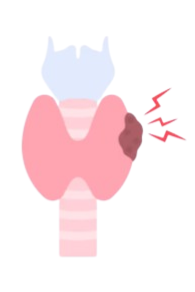

Homeopathy for Hashimoto’s Thyroiditis
Abstract
Hashimoto’s Thyroiditis is an autoimmune condition in which the immune system attacks the thyroid gland, often leading to hypothyroidism. Conventional medicine relies mainly on thyroid hormone replacement therapy and, in some cases, immunosuppressants. However, this approach does not address the underlying constitutional, emotional, and psychosomatic factors. Homeopathy, guided by a holistic philosophy and individualized prescription, offers both constitutional and supportive treatment. Integrating German New Medicine (GNM) conflict theory further helps uncover the psycho-biological roots of the condition. This paper explores Hashimoto’s Thyroiditis from a homeopathic perspective, including disease understanding, case-taking, rubrics, materia medica, and GNM interpretation.
Introduction
Hashimoto’s Thyroiditis (chronic lymphocytic thyroiditis) is the most common autoimmune thyroid disorder.
It primarily affects women (female:male ratio approx. 10:1) and usually presents between the ages of 30–50.
Pathogenesis: autoantibodies against thyroid peroxidase (TPO) and thyroglobulin gradually destroy thyroid tissue.
Outcome: progressive hypothyroidism with symptoms ranging from subtle fatigue to severe metabolic slowdown.
General Symptoms
Fatigue, sluggishness
Cold intolerance
Weight gain despite normal or reduced appetite
Dry skin, hair fall, brittle nails
Constipation
Puffy face
Swelling around eyes
Hoarseness of voice
Muscle weakness and cramps
Slow heart rate
Neuro-psychological Symptoms
Depression, low mood
Forgetfulness, brain fog
Lack of concentration
Anxiety or irritability
Gynecological Symptoms (women)
Irregular periods, heavy bleeding (menorrhagia)
Infertility, recurrent miscarriage
Physical Examination
Goiter (diffuse or nodular enlargement of thyroid)
Firm, rubbery thyroid
Bradycardia
Delayed reflex relaxation
Mind Rubrics Relevant to Hashimoto’s
From Kent, Synthesis, and Complete Repertory:
Anxiety about health
Fear of misfortune
Grief, ailments from
Helplessness, feeling of
Slowness, mental
Weakness of memory, forgetful of words while speaking
Aversion to work, mental & physical
Desire for company yet aversion to consolation
Indifference to loved ones
Thyroid conflicts relate to:
Left thyroid lobe: “Not fast enough to catch something” (performance pressure, speed-related conflict).
Right thyroid lobe: “Not fast enough to get rid of something unpleasant.”
Patients often experience:
Long-standing pressure to perform faster, speak up, or meet expectations.
Feeling incapable of handling life’s pace.
Suppressed anger or helplessness.
When unresolved, these conflicts affect the thyroid tissues, leading to chronic autoimmune inflammation.
